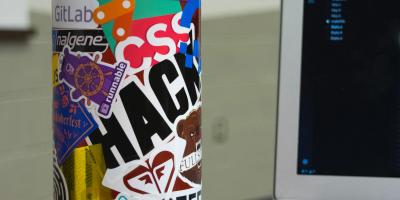The Women of the Drupal Community: svettes

Collection :
Previously in the Women of Drupal series, we talked with Fatima Sarah Khalid (sugaroverflow) about the importance of building better representation in tech, what it’s like to be the only woman in the classroom, and why community is just as important as code. Catch up and read Fatima's story, here.
If you follow Acquia’s instagram account, chances are you marveled at Shannon Vettes’ (svettes) recent Takeover Tuesday. Shannon provided a glimpse into her daily life; she is based in Paris and works as a senior program manager for all of Acquia’s factories products. She’s also been apart of the Drupal community for over seven years, and has been a longtime contributor to the project.

I had the opportunity to spend time with Shannon during her last visit to Acquia’s headquarters in Boston. We enjoyed an early morning coffee on the office roofdeck, and talked about what it’s like to have a bubbly personality in tech, pioneering program management for Drupal initiatives, and how to become “the person you want to meet.”
Gigi: How did you get your start in tech?
Shannon: I’m originally from Wisconsin. Small town, small school. Even from a young age, I loved the idea of making something work. That was really my inspiration to get into tech. I started learning to type on Mavis Beacon. Anyone who’s over 30 probably knows what Mavis Beacon is. Anyone under, I doubt it. I’m dating myself now.
When I learned to type, that was an accomplishment. I learned to create small programs, and I started to get really excited about computers. Later on, I learned that I liked design and UX too. My path through technology has been varied. I went from field to field to figure out which one I liked best. I landed in program management because I like all of the aspects of what goes into making multiple projects successful as a whole. There is an interpersonal aspect of helping people work together and think strategically that I really enjoy.
Gigi: What does it mean to be program manager?
Shannon: Being a program manager means working across the whole organization to coordinate the work that it takes to successfully bring a new product into the market. When we make something, we don’t just want to say, “Engineering is complete - ship it.” That approach can cause a lot of problems. We need customer success and sales teams informed and trained, security and compliance requirements validated, and documentation and external training needs to be written or updated. There are a lot of things that are impacted by a new product or feature, and I’m here to help it go well.
Gigi: How did you first discover Drupal?
Shannon: It all started with a tweet. Someone I followed retweeted a note from a small-business owner. He was describing how amazing it is to have a great colleague, who is talented and works well with your team. I tweeted back and said, “100% agree with you. Nothing better than having a strong team with a united vision that are all ready to rock on something, with the skills to accomplish the goal.” It turned out that he was a starting a Drupal shop, and was looking to build a team. He hired me as a remote program manager after we had some interviews in Paris. In the end, it was a wonderful experience. It’s a great company, called Blue Spark.
My Drupal experience really started at DrupalCon Chicago. I went and it was wonderful. I loved the culture, the experience and the positivity radiating from everyone. It’s such a beautiful vision to be a part of when everyone in the community is committed to building something together.
I ended up meeting Angie Byron (webchick) when I was there. I remember asking her, “Hey, who’s helping project manage D8?” She was like, “That’s a good idea. We should to that.” I ended up working on developing program management for each initiative, which was a new concept for the community. I wanted to answer questions like, “What do we mean by initiative? How can we make things better and faster? What risks are we managing or monitoring? How is our work being perceived by the community? ”
We ended up developing roadmaps, making initiative pages to communicate progress and plans, identifying and mitigating risks, and more. It was such a great experience and taught me so much. It was a lot of work, but we all brought our skills to the table and accomplished a lot. I felt appreciated, acknowledged and that I helped them, which is all you can really ask for if you’re trying to volunteer for something.
Gigi: What Drupal project or contribution are you working on and/or most proud of?
Shannon: I think it’s probably my contributions to Drupal 8 Initiatives. To this day, I still feel like I didn’t do that much ...
Gigi: I’m sure that’s not true.
Shannon: I don’t know, honestly. I think the credit should be given to people who built the stuff.
I was just someone who tried to grease the wheels, helped the community think about things in a new way, and helped them to coordinate their work and communication more effectively.
I also made lifelong friends, which is something I’ll always be grateful for. It’s awesome to have an experience where you meet people that you respect, admire, learn from, and enjoy working with. Drupal is synonymous with that for me.
Gigi: What challenges have you've faced; technical and career-wise?
Shannon: I’ve hit several walls. Which one to talk about first? I think one of them has been my personality. I’m a pretty bubbly person. I like to have fun, I love to laugh, I’m very outgoing, very social. At times I can be strong-willed, which doesn’t rub everyone the right way. There are other personality types that are very common within the IT world, which are more introverted. In comparison, I can be intimidating or overwhelming. I suspect I am annoying to some [laughter]. I’ve had to learn how to become more socially sensitive and to read the room. There’s a different tone that I’ve learned to develop over time, which has been critical because I’ve had several people be like, “You’re intense. You’re too much for me.” Then they don’t want to work with you. Learning how to adapt my personality and my personal style into the context of different personality types has been really important.
Gigi: Is that frustrating in anyway?
Shannon: Sometimes.
Gigi: Because the way you describe working with various personality types is very generous, thoughtful, and practical. In some ways, it also sounds like it could be frustrating. I would hope that the IT community as a whole would be open to accepting more social ways of working as well.
Shannon: I think in some ways it feels like this is the price of entry. I don’t usually find it that frustrating. What frustrates me were other barriers. For example, people always assume that because I’m bubbly and have a good sense of humor, that I’m also young and inexperienced. Earlier in my career, I was even asked “Are you the intern?”. That’s hard to hear. As a result, I’ve had to develop gravitas and authority. I think that can be really hard for women in technology too.
Today, I’m in a position where I’m very sensitive to the audience that I have in front of me. I won’t pull any punches, but I won’t take any either. If someone says to me, “You’re not experienced enough to do this”, I have no qualms about saying, “Here’s my experience, here’s what makes me qualified.” When I was starting out in tech, I knew things, but I was not always as confident in myself. I didn’t have the authority to speak my mind, and I was often the only woman in a room full of men.
Gigi: Have you witnessed that gender imbalance shift throughout your career?
Shannon: Unfortunately, I still think it’s alive and well. That’s why I want to see a lot more women in this field. Women are every bit as capable and experienced. We are important in these conversations, and can be critical to the development process. I just don’t want to see this overlooked or belittled anymore. It really is near and dear to my heart.
Gigi: What keeps you inspired and passionate with your work?

Shannon: Drupal continues to be very inspiring and fulfilling even after a decade of being involved. I still keep coming back every year for small projects. I have two kids and a husband, a life, and a very demanding job, so it’s hard to find time to contribute, but I always find something. I think everyone can. Everyone should! *coughs documentation initiative coughs*.
Drupal can be an easy program to support, because you can literally pick up anything. If you are looking for something new, you can also contact me [laughter]. Tell people to call Shannon if you ever want to do something in Drupal, but you’re not sure what. I’ll find you something or find you a mentor. It won’t be hard. Helping find people, helping inspire people, that’s really fun.
Gigi: What does the future of Drupal look like to you? Is it adoption, features? What makes you excited about that future?
Shannon: I think the future of Drupal is going to involve making the behind-the-scenes connections, even better. This means making applications, programs, sites and “all the things” talk to each other. This is very difficult to do, but it’s something that Drupal does really well. Drupal is really good at connecting different technologies. I think that’s a sweet spot to be in.
I also think that our ability to impact UI and to help site builders and non-technical audiences create is going to be a strength moving forward. Having strong connectability on the back end and a flexible front end is a powerful combination. All of this is also driven by a group of people who are intelligent, interesting, varied, passionate, and fun. That’s another strength. Those three things, I think, is what’s going to keep us relevant. It’s what keeps people coming back to Drupal.
Gigi: What advice would you give your younger self or someone who is just starting out?
Shannon: Go slow. Stop trying to do all the things and be all the solutions to all the problems. I still struggle with that today, trying to do too much too fast. Don’t rush and set the expectation that you’re not going to rush. I have been much more successful when I stop to think about the outcomes I want, and set myself up for success. It’s ironic because my job is so much planning for other things. I don’t take enough time to plan for myself.
I would also tell my younger self “Be patient.” Give yourself time to develop your expertise. It’s great to find challenges, but allow yourself the opportunity and means to accomplish goals in due time. It’s especially important to be patient in situations that have conflict or risky outcomes.
I also think it’s important for young women to have good role models. Sometimes I wonder what would have happened if I had met women like Angie or XJM earlier in my career. Would I have become a programmer? When you find these kinds of role models, I encourage you to talk to them. Befriend them, learn about them. What are they doing? How are they doing it? There are some very inspiring personalities within Acquia too. I think we need to encourage other people to not be afraid to reach out.
My last piece of advice would be, stop being so afraid of what other people think about you, and be focused on what you will think about yourself. Concern yourself with your own vision of who do you want to be. One of my favorite mottos is, “Be the person you want to meet.” It keeps me always thinking about, “Who would I want to know? Why would I want to know them? How do I put myself in a path to be more like that?” It’s a great motto for someone who is searching for themselves.
Gigi: I love that motto.
Shannon: It’s actually pretty self-centered if you think about it. Not something I want to be, I’m all about the irony today.
Gigi: But I think we all need to be our own cheerleader. Knowing how to do that and not being embarrassed is an important thing to learn.
Shannon: That’s true. It’s important to take time to consider how you can become the person who represents a vision you admire. I’m always interested in being with people who seem to really own their own version of “who they are”. I think people are naturally drawn to that and it’s something worth investing in no matter what field you go into.

